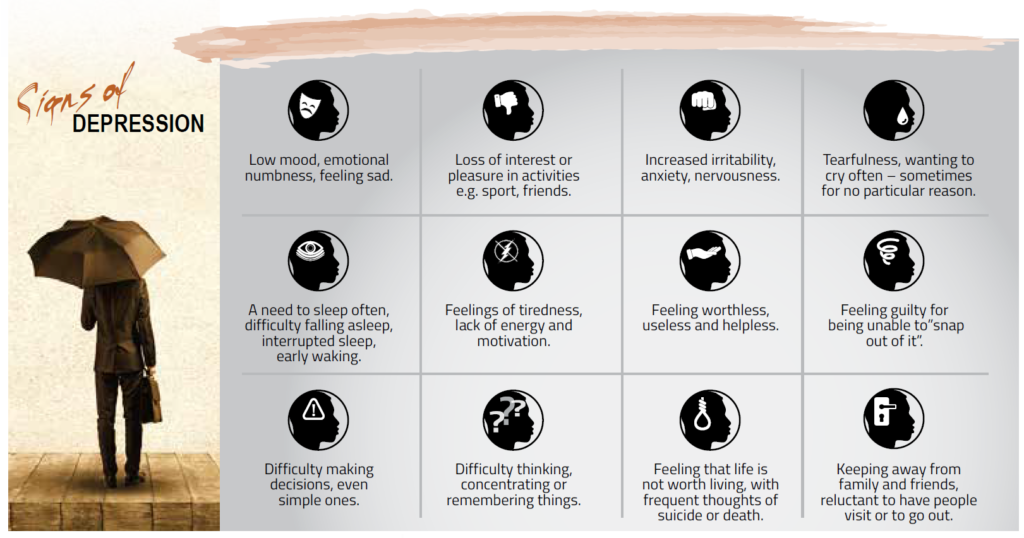About Depression
What Is Depression?
It's more than just feeling down. And it's serious.
Depression affects your emotions, thoughts, eating and sleeping patterns, relationships and health.
This mood disorder causes you to feel deeply distressed, hopeless and sad over a long period of time. In fact, life loses meaning for some depressed people.
So it's more than having a few tough days. And there's no simply snapping out of it. Without treatment it can last for weeks, months or even years.
Depression lowers self-esteem, damages self-confidence and makes doing everyday things difficult.
Even brushing your teeth can become an insurmountable task.
While you can't wish it away, the great news is that depression can be treated. And it's more common than you think - 1 in 4 people suffer from the illness.
Am I Depressed?

Some signs:
- A sudden change in mood, with feelings of hopelessness and despair
- Low mood
- Loss of interest in activities previously enjoyed
- Irritability
- A significant increase or decrease in appetite and weight
- Suicidal thoughts
- Sleep disturbances
If you are experiencing some of these signs, it may help to talk to someone about it.
Below are some suggestions to guide you:
-
Start a conversation with someone you trust. Here are some conversation starters.
- “Hi. I'm not sure if you've noticed, but I haven't been myself lately and I really need someone to talk to.”
- “Hi. So lately, I've been feeling down but I'm not sure what's wrong. Do you mind if we go for a walk?”
- “I'll admit that I've been struggling lately. I've been going through so much.”
-
Speak to your doctor - these questions may help.
- I think I may be depressed. Could you help me navigate this?
- What is depression?
- What are my treatment options?
- What are the risks and side effects of this treatment?
- What happens if I don't do anything about this diagnosis?
- How can I talk to my family about this?
8 Building Blocks To Better Brain Health
{{block.title}}
{{block.subtitle}}
Helping Others
-
Being Supportive
Seeing a loved one struggling with a brain health challenge is difficult. And it can be hard to know how to help and support them. Here are some things to consider when trying to support someone who is struggling.
Know what the warning signs of brain health challenges, e.g. a loved one becomes withdrawn and there are changes in their behaviour.
How to be supportiveThese are things you can do to support someone with brain health challenges.
- Start the conversation.
- Listen actively.
- Don't offer advice unless asked for.
- Spend time with them.
- Learn about brain health challenges and how it impacts them
- Celebrate the small wins with them.
- Send encouraging messages.
- Check in regularly to remind them you are there for them.
- Be affirming.
- Be patient. You aren't there to fix them just to be supportive.
- Keep treating them the same.
- Ask them how they want to be supported, eg. 'would it help if I …'
- Validate their feelings and experiences.
- Remind them that seeking help is a sign of strength.
-
Talking about it
The most important and most difficult step is to start the conversation. Show your concern and openness to be there for them. You don't have to be an expert and you don't need to have the answers. Reassure them and use 'I' statements when talking. For example, 'I am concerned about you …'. Be patient and don't judge their feelings or thoughts. And most importantly, listen to them. Reframe the thinking: if it were diabetes, would they seek help? -
Learn about mental health conditions and treatments
Learn all you can about brain health challenges. The more you know about symptoms, challenges and treatments, and what to expect, the better you can support your loved one. Read our Brain Health and Brain Strain pages for more information. -
Help to address possible barriers
Would transport be a barrier? Do you need to help research therapists? Try to anticipate and help address possible barrier to them seeking and getting help. -
Ensure you practice self-care
It's important to take care of yourself too. Offer support and reach out for help if you need it for yourself. Contact the South African Depression Support Group for more information on support groups you can join. -
If you feel your loved one is at risk of hurting themselves or others, contact one of the crisis/suicide/help lines.
- Get help here
- Suicide Crisis Line: 0800 567 567
-
SADAG Mental Health Line: 011 234 483

